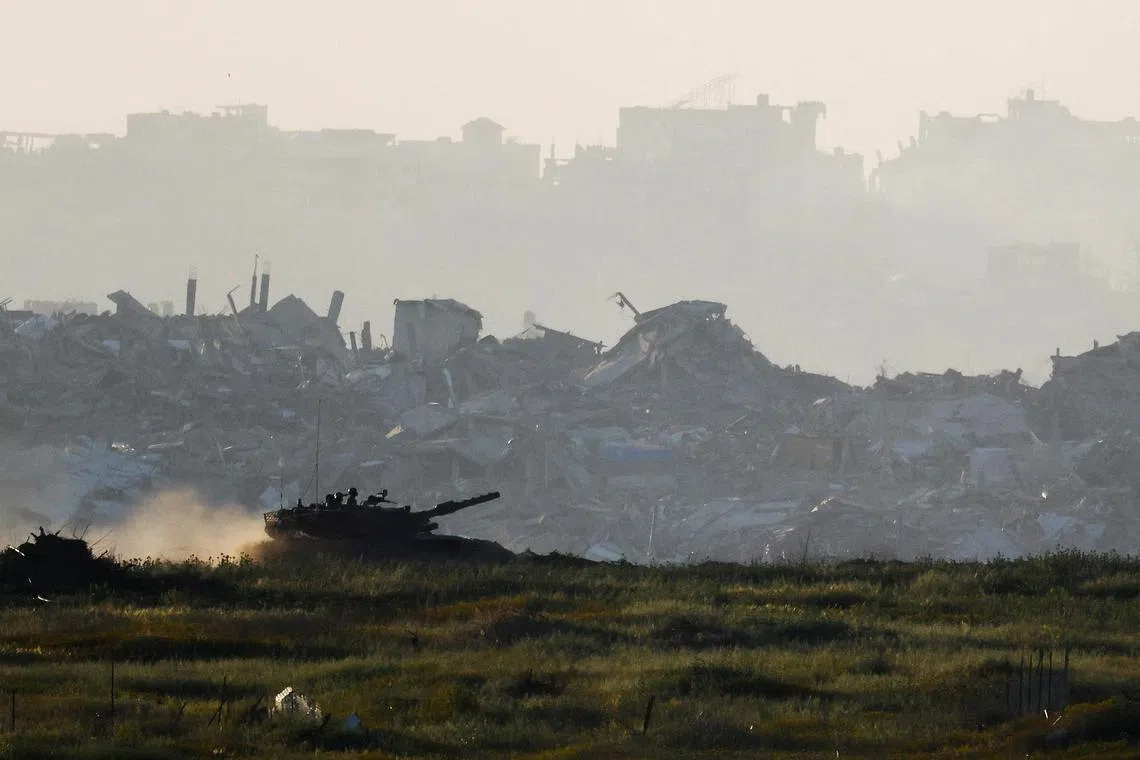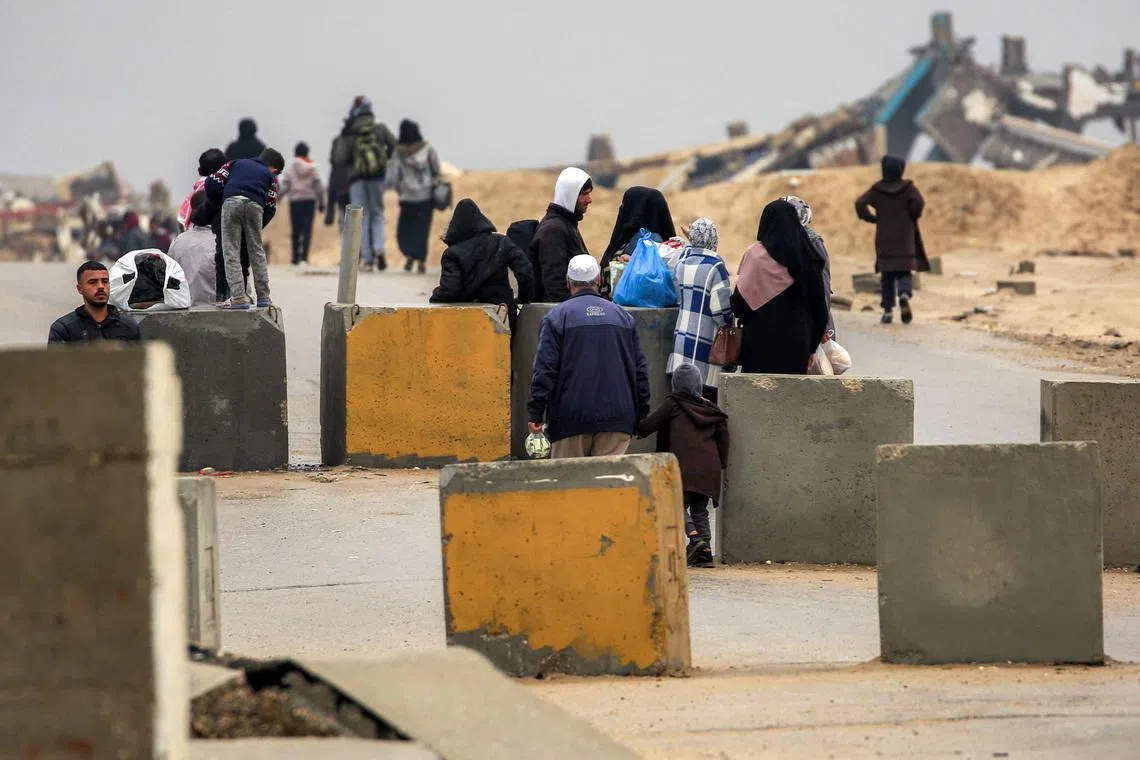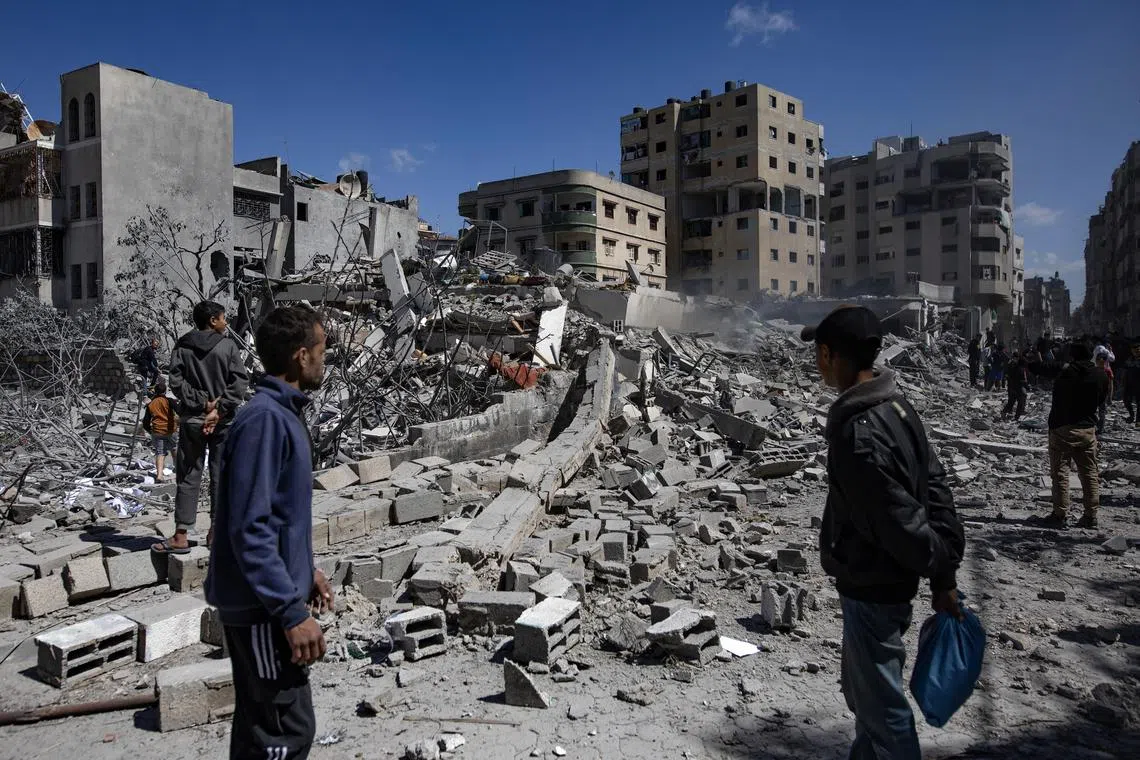After air strikes, Israel says it has launched new ground operation in Gaza
Sign up now: Get ST's newsletters delivered to your inbox

A tank manoeuvring inside Gaza, as seen from Israel's border with Gaza, on March 19.
PHOTO: REUTERS
CAIRO/JERUSALEM - The Israeli military said on March 19 its forces have resumed ground operations in the central and southern Gaza Strip, as a second day of air strikes killed at least 48 Palestinians, according to local health workers.
The renewed ground operations come a day after more than 400 Palestinians were killed shattering a ceasefire
The Israeli military said its operations have extended Israel’s control over the Netzarim Corridor, which bisects Gaza, and were a “focused” manoeuvre aimed at creating a partial buffer zone between the north and the south of the enclave.
Palestinian militant group Hamas said the ground operation and the incursion into the Netzarim Corridor were a “new and dangerous violation” of the two-month-old ceasefire agreement. In a statement, the group reaffirmed its commitment to the deal called on mediators to “assume their responsibilities”.
The United Nations said an Israeli air strike
Mr Jorge Moreira da Silva, executive director of the UN Office for Project Services, said: “Israel knew that this was a UN premises, that people were living, staying and working there, it is a compound. It is a very well-known place.”
UN Secretary-General Antonio Guterres called for a full investigation and condemned all attacks on UN personnel. In a statement he said the strike brought to at least 280 the number of UN colleagues killed in Gaza since October 7, 2023.
In Sofia, the foreign ministry said a Bulgarian working for the UN died on March 19 in Gaza, citing preliminary information. It was not immediately clear if the Bulgarian was the foreign UN staffer killed in Gaza.
Israel, which has vowed to eradicate Hamas, said its latest onslaught was “just the beginning”.
The US State Department blamed Hamas for the resumption of hostilities and said there was still a US-crafted “bridge” proposal on the table to extend the ceasefire and bring about the release of hostages held by the group in Gaza.
“The opportunity is still there, but it’s closing fast,” a State Department spokesperson said, adding that Hamas’ response was “totally unacceptable” and that the US stood with Israel.
Trading blame
In the latest violence, local health workers said an Israeli air strike killed four people and wounded 10 others in a house in the northern Gaza Strip town of Beit Hanoun, where the army renewed evacuation orders to residents earlier on March 19.
In Beit Lahiya, a new Israeli air strike killed 14 people at a mourning tent, medics said.
Israel and Hamas accuse each other of breaching the truce, which had offered a respite for Gaza’s 2.3 million residents after 17 months of war that has reduced the enclave to rubble and forced most of its population to evacuate multiple times.
The Israeli campaign has killed more than 49,000 people in Gaza, Palestinian health authorities say, and caused a humanitarian crisis with shortages of food, fuel and water.
Israel has accused Hamas of using Palestinian civilians as human shields. Hamas denies this and accuses Israel of indiscriminate bombings.

People crossing concrete barriers erected in the Netzarim Corridor, which bisects Gaza, in February 2025.
PHOTO: AFP
The war - the most devastating episode in decades of Israel-Palestinian conflict - was triggered by a Hamas-led attack on southern Israel
Prime Minister Benjamin Netanyahu’s decision to resume bombardments has triggered protests in Israel as 59 hostages are still held in Gaza, with 24 of them believed to be still alive.
A coalition of hostage families and protesters against Netanyahu’s moves against the judiciary and other parts of the security establishment has regrouped and accuses the prime minister of using the war for political ends.
Palestinian medics said Israeli tank shelling on the main north-south Salahuddin Road killed one Palestinian and wounded others.
Hamas spokesperson Abdel-Latif Al-Qanoua told Reuters the closure of the Salahuddin Road was a “total coup” against the three-phase ceasefire agreement and a tightening of the blockade on Gaza.
He said the group would welcome any proposal “as long as it is based on launching negotiation on the second phase and a complete end to the war in Gaza”.
Earlier on March 19, the Israeli army dropped leaflets in the northern and southern Gaza Strip, once again ordering residents to evacuate their homes.
‘Force you have not seen yet’
Defence Minister Israel Katz issued a video statement warning Gaza residents that evacuation from combat zones would begin shortly.
He said airstrikes were “only the first step” and if the hostages were not released, “Israel will act with force you have not yet seen”.

Palestinians inspecting a destroyed house after an Israeli airstrike in Gaza City, on March 19.
PHOTO: EPA-EFE
The renewed violence was condemned by Western nations, including France and Germany, as well as Qatar and Egypt, which had been acting as mediators in the ceasefire negotiations.
Israel and Western powers do not want Hamas to play any role in the enclave when the war is over.
Arab nations drew up a plan for peace and reconstruction in Gaza after a proposal from US President Donald Trump to resettle Palestinians and turn it into a “Riviera” of the Middle East
European Union foreign policy chief Kaja Kallas said on March 19 she told Israeli Foreign Minister Gideon Saar that the situation in Gaza was “unacceptable”.
Jordan’s King Abdullah called for the ceasefire to be restored and for aid flows to resume.
“Israel’s resumption of attacks on Gaza is an extremely dangerous step that adds further devastation to an already dire humanitarian situation,” he said on a visit to Paris for talks with French President Emmanuel Macron.
However, Dorothy Shea, acting US ambassador to the United Nations, said on March 18 the blame for the resumption of hostilities


